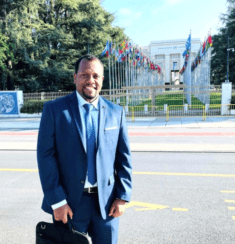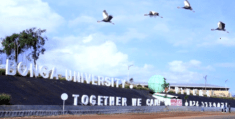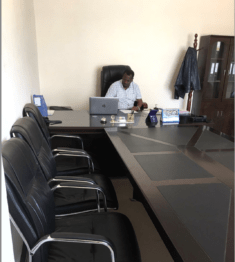
Muluken Haile
We had the pleasure and opportunity to interview Mr Muluken Haile who was the former Vice President, Administration and Student Affairs division of Bonga University (Ethiopia).
Haile specializes in project management, particularly small business development, marketing management and human resources management.
He was awarded the 2018 Leadership Excellence Award for his outstanding work in establishing the entire Administration section of the University of Bonga, as well as designing the community-based training program.
We discussed with Muluken more about his work at the university.
GBN: Tell us a little about Bonga University and your role.
Muluken: Well, Bonga University is one of the public higher educational institutions in Ethiopia. It aspires to be the leading institution of higher education in Africa in natural resource management and utilization by 2030. I had the privilege to be appointed as the vice president of the administration and student affairs division and set up the entire administrative section of the university from scratch.
GBN: How did you go about doing that?
Muluken: When I was appointed, I was given a lot of responsibility, which included setting up human resources, finance, purchasing and property administration, facilities management, and basic student services departments at the university. Therefore, I began my work with a SWOT analysis to determine the university's internal strengths and weaknesses as well as external opportunities and threats. After identifying the existing human, material and financial resources, I then set goals, identified, evaluated and selected alternatives, formulated the support plan, and finally established a sequence of activities to set up a fully functional administrative section.
GBN: What were the main sequences of activities?
Muluken: First of all, as a manager, I was expected to plan, organize, direct and control the whole work of the Administration Division. For any manager, planning is the first and most important function because it allows you to stay focused on the objectives, identify possible risks, create innovative ideas and measure progress. In this regard, I had to plan and coordinate the university's budget, finance, purchasing, property administration, human resource management, facilities management and core student services and affairs.
GBN: What were some of your other activities as administrative vice president?

Bonga University
Muluken: Another major activity was organizing the work of the division.
After accomplishing the planning function, I then turned my attention to synchronizing and combining human, physical and financial resources. To achieve good results, all three resources must be used. Therefore, in this respect,
- I identified and grouped the work of the section by considering all directorates and departments;
- established the hierarchy of administrative work (reporting relationships; this facilitated employee performance evaluation and effective monitoring);
- then assigned the appropriate level of responsibility and authority to each manager, team leader and employee;
- and finally, coordinated all activities performed by individuals, groups and departments. This allowed us to avoid conflicts, duplication of tasks and waste of time, budget and energy.
GBN: Can you tell us about your leadership style?
Muluken: Leadership is the most important factor in making everything work; without leadership, all other resources in the organization are ineffective.
While there are many leadership styles, I prefer to try each one depending on the situation I am facing. I prefer the situational leadership style for the following reasons:
- I usually connect with employees by using my interpersonal skills to motivate, encourage them to follow my plan of action, and inspire team members to perform at their best whilst explaining to them the bigger picture. We can call it transformational leadership.
- Sometimes I work closely with team members and focus more on building relationships within the team. This has worked for some competent employees whose performance was inconsistent.
- At times when we need to move fast as a team and complete time-sensitive tasks, I will be autocratic and outline exactly what needs doing and by when.
- I delegate full authority to employees who are able to work and accomplish tasks on their own with little guidance.
GBN: What are your strategies for having complete control of your work as vice president of the university?
 Muluken: Controlling all work is one of the primary functions of any manager. In this regard, I required directorate directors and department heads to provide their results on a weekly, monthly, quarterly, semi-annual and annual basis. This function allows me to measure progress against divisional and departmental goals, identify variances and facilitate timely corrective action. I evaluate the execution of the plan and make adjustments as necessary to ensure that the organizational goal is being met effectively and efficiently.
Muluken: Controlling all work is one of the primary functions of any manager. In this regard, I required directorate directors and department heads to provide their results on a weekly, monthly, quarterly, semi-annual and annual basis. This function allows me to measure progress against divisional and departmental goals, identify variances and facilitate timely corrective action. I evaluate the execution of the plan and make adjustments as necessary to ensure that the organizational goal is being met effectively and efficiently.
GBN: What were your proudest achievements?
Muluken: Well, I have a lot of achievements while working for Bonga University. For example:
- preparing the divisions as well as the university's strategic plan, guidelines, staff and student code of conduct,
- establishing a fully operational and resourced administration and student services division,
- creating a highly effective administrative section/division with a nearly complete, energetic and motivated team that is able to communicate horizontally and vertically to get the job done,
- negotiating with parties and vendors regarding university contracts and ensuring the protection of the university's interests,
- representing the university before various governmental and regulatory agencies in different areas, and
- initiating and implementing a community-based training program to identify and solve community problems that were related to education, health, business, agriculture and infrastructure.
For these works, I received the 2018 Leadership Excellence Award from Bonga University.
GBN: What were the main challenges you faced in your work?
Muluken: There have been many challenges, for example,
Making timely data-driven decisions. To achieve this, I have put a lot of effort into, for example, using the range of technology solutions to automate workflow and make timely data-driven decisions. In this regard, we were able to automate most of the major departments at the university. One of them was the finance department. Before automation, getting a budget summary or other financial reports could take two to three business days, whereas after automation, it only takes a few clicks or two to three minutes.
To feed thousands of students three times a day. Sometimes your "plan A" fails due to unexpected external factors, so you need to implement your "plan B." For example, in the event of a power cut, you're supposed to use your backup generators, and in the event of a technical failure, you use the firewood set aside to cook the students' food, and if that fails as well, we have a contractual agreement with outside vendors that could provide a hot meal for our students, so all of these jobs require proactivity, good anticipation, and good communication with all the stakeholders and I think we've been successful.
Providing medical service in case of rapid spread of diseases among our students. In this regard, we have a comprehensive and cost-effective approach to risk management that focuses on prevention, mitigation, preparedness, response, and recovery in the event of an outbreak. If we are faced with a situation beyond our capacity, we also have a contractual agreement with nearby government referral hospitals.
GBN: Thank you very much for your time, and we appreciate the opportunity to speak with you.



 Muluken: Controlling all work is one of the primary functions of any manager. In this regard, I required directorate directors and department heads to provide their results on a weekly, monthly, quarterly, semi-annual and annual basis. This function allows me to measure progress against divisional and departmental goals, identify variances and facilitate timely corrective action. I evaluate the execution of the plan and make adjustments as necessary to ensure that the organizational goal is being met effectively and efficiently.
Muluken: Controlling all work is one of the primary functions of any manager. In this regard, I required directorate directors and department heads to provide their results on a weekly, monthly, quarterly, semi-annual and annual basis. This function allows me to measure progress against divisional and departmental goals, identify variances and facilitate timely corrective action. I evaluate the execution of the plan and make adjustments as necessary to ensure that the organizational goal is being met effectively and efficiently.